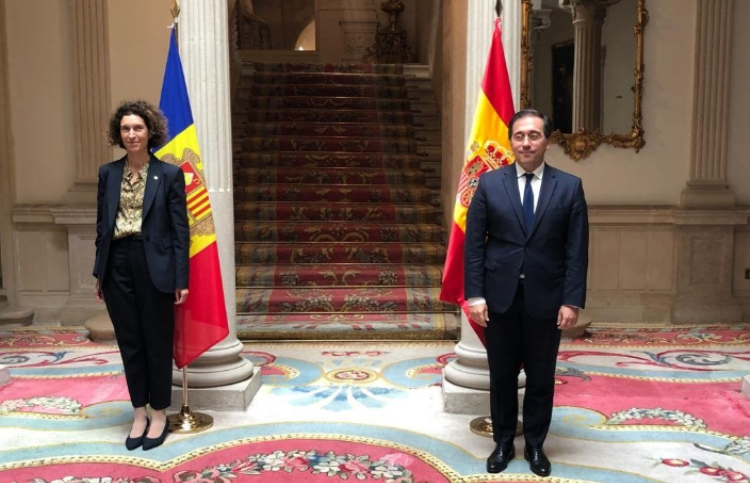The Diplomat
The Minister of Foreign Affairs, José Manuel Albares, and the Polisario Front openly disagreed yesterday on the role of Spain as “administrative power” in its former colony of Western Sahara.
During an intervention in the Congress in which he avoided any criticism of Morocco for the house arrest suffered for months by the Saharawi activist Sultana Jaya (and in which he again appealed to “discretion”), Albares said that Spain is not “administrative power” of Western Sahara because “neither in the list of non-self-governing territories nor the United Nations nor any resolution says that Spain is”. “It ceased to be so in the year 75”, he added.
Hours later, during a joint press conference with his Andorran counterpart, Maria Ubach, at the Palacio de Viana, the minister affirmed that, “beyond a debate that is legal or semantic, what is important is where Spain is and where it will continue to be, in the group of friends in support of the Sahara”, from which it supports the efforts of the United Nations and its new special envoy for Western Sahara, Staffan de Mistura, so that “both parties find a solution within the framework of the UN and according to the principles of the UN Charter”.
Albares’ affirmations were strongly criticized by the Polisario Front, whose delegate in Spain, Abdulah Arabi, described as “ill-advised” the statement of the Minister and demanded “an active role on the part of the Spanish State so that the Saharawi people can put an end to a long period of suffering, through the exercise of its inalienable right to self-determination and independence”.
The government assures that Spain disassociated itself from all responsibility by a letter sent in 1976 to the UN Secretary General after the signing of the Madrid Tripartite Agreements of 1975. However, according to Arabi, Spain cannot rely on these agreements to disassociate itself because they were annulled both by the UN and by the National Court itself.
Spain signed in 1975 the Madrid Tripartite Agreements, by which it handed over territorial control (but not sovereignty) to Morocco and Mauritania. Control passed in its entirety (by accession) to Morocco in August 1979, following Mauritania’s decision to relinquish its share (and to recognize the Polisario Front as the representative of the Saharawi people). On February 27, 1976, the Polisario Front proclaimed the Saharawi Arab Democratic Republic (SADR). Morocco’s sovereignty has not yet been recognized by the international community.
Both the Mauritanian withdrawal and the subsequent Moroccan annexation meant the de facto invalidation of the Madrid Tripartite Agreement, since it had been broken unilaterally by two of the three parties. The UN has never recognized the validity of this agreement, nor has it admitted Morocco as the administering power of the territory, which legally continues to appear as “the only Spanish territory pending decolonization”. For its part, the National Court affirmed in 2014 that “Spain de iure, although not de facto, remains the administering power of the territory, and as such, until the end of the period of decolonization, has the obligations contained in Articles 73 and 74 of the Charter of the United Nations, including providing protection, including jurisdictional protection, to its citizens against any abuse.”
The new controversy about the status of Spain in its former colony takes place in the midst of the serious diplomatic crisis experienced by Madrid and Rabat a few months ago after the reception in Spain of the leader of the Polisario Front, Brahim Ghali, which resulted in a massive and uncontrolled entry of immigrants in Ceuta with the complicity of the Moroccan authorities, as well as in a call for consultations of the Moroccan ambassador in Madrid and in a whole series of public accusations against Spain. King Mohamed VI publicly announced last August 21 the start of a reconciliation process to end the crisis with Spain and Albares and his Moroccan counterpart, Nasser Bourita, held their first telephone conversation since the crisis at the end of September, in which they agreed to hold “a face-to-face meeting soon”.







